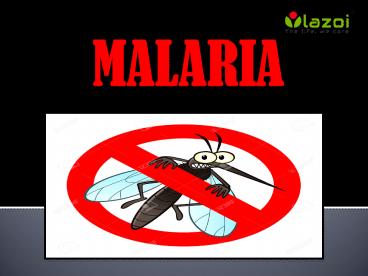Malaria: Causes, symptoms, complications, treatment and prevention. - PowerPoint PPT Presentation
Title:
Malaria: Causes, symptoms, complications, treatment and prevention.
Description:
Malaria is an infectious disease that is caused by mosquito-borne plasmodium parasite which infects the red blood cells. It’s one of the deadliest diseases in India. There’s no vaccine for malaria yet and immunity occurs naturally through repeated infection. Common symptoms are fever, chills, vomiting, nausea, body ache, headache, cough and diarrhea. If untreated, it can lead to complications like jaundice, dehydration, anemia, brain malaria, liver failure and kidney failure. To know more visit here: www.lazoi.com – PowerPoint PPT presentation
Number of Views:997
Title: Malaria: Causes, symptoms, complications, treatment and prevention.
1
MALARIA
2
Introduction to Malaria
- Malaria is an infectious disease that is caused
by mosquito-borne plasmodium parasite which
infects the red blood cells. Its one of
the deadliest diseases in India. Theres no
vaccine for malaria yet and immunity occurs
naturally through repeated infection. Common
symptoms are fever, chills, vomiting, nausea,
body ache, headache, cough and diarrhea. If
untreated, it can lead to complications like
jaundice, dehydration, anemia, brain malaria,
liver failure and kidney failure.
Children, pregnant women, and the elderly -
anyone with decreased immunity is at a greater
risk.
3
Causes of Malaria
- Malaria is an infectious disease that is caused
by plasmodium parasite which infects the red
blood cells and is characterised by fever, body
ache, chills and sweating. Of the four species
that cause malaria (plasmodium vivax, plasmodium
falciparum, plasmodium ovale, plasmodium
malariae) plasmodium falciparum is the most
serious and can cause serious complications. An
individual can be infected with two species at
the same time.
4
Symptoms of Malaria
- After been bitten by an infected mosquito, the
disease takes around 14 days to manifest.
Commonly observed symptoms are - Fever
- Headache
- Chills
- Sweats
- Fatigue
- Nausea and vomiting
- Some of the other symptoms include dry cough
and muscle pain. If youve been diagnosed with
the disease, then you should take adequate rest
until these symptoms reside.
5
Treatment of Malaria
- The National Institute of Malaria Research has
developed guidelines on diagnosis and treatment
of malaria - Chloroquine is given to the patient and dose is
given depending upon the body weight of the
patient. The use of Chloroquine has led to the
emergence of many Chloroquine-resistant
falciparum malaria cases. For such individuals, a
drug called Artemisinin is given. - Avoid giving anti-malarial drugs on an empty
stomach. Always give the first dose under
observation. - Give plenty of fluids.
- If no improvement occurs within 48 hours, call
the doctor. - Look for any warning signs of dehydration,
reduced urine output, bleeding, seizures or coma.
6
Complications of Malaria
- If untreated within 24 hours of the symptoms
showing up, it can be a very serious and life
threatening disease because of the following
complications - Severe anaemia caused due to the red blood cells
being destroyed - Jaundice
- Dehydration
- Cerebral malaria- The infected red blood cells
block the vessels in the brain and lead to
seizures and coma and eventually death if not
treated. - Very low BP leading to shock
- Liver failure
- Kidney failure
7
Preventions of Malaria
- With some simple yet effective precautionary
measures, one can prevent malaria. Here are some
of them which you can try - Mosquitoes breed in stagnant water - whether it
is a nallah near your house, a pond in the
neighbourhood or a water puddle near your house
from a long time. Get them closed, cleaned up as
soon as possible. Even plants in pots, bird
baths, fountains etc should not hold stagnant
water. The water in the swimming pools needs to
be circulated and chlorinated. - If you store water in the house due to its
shortage, close the container.
8
Preventions Continue
- Use mosquito screens, nets, fibre glass meshes or
magnetic insect repellent screens for your
windows if you live in a mosquito-infested area.
If possible, avoid the time immediately after
dusk to venture out especially so for children.
If you need to, wear clothes that cover your body
to a large extent. Cover the exposed parts with a
mosquito repellent. - Indoor residual spraying with an insecticide is
also recommended. - Insecticide treated bed nets should be used in
areas where mosquitoes and malaria are rampant. - If travelling to a malaria-endemic area,
chemo-prophylaxis is given to travellers. Consult
your doctor and discuss your travel.
9
Diagnosis of Malaria
- 1) Microscopic Diagnosis
- Blood smear
- Fluorescent Microscopy
- Quantitative Buffy Coat (QBC )
- 2) Antigen Detection
- Immunochromatographic Dipstick RDT
- 3) Serology
- IFA
- ELISA
- 4) Molecular Diagnosis
- PCR
- Real time PCR
10
For More Updates
- Logon
- www.lazoi.com
- Like us on Facebook
- https//www.facebook.com/LazoiTheLife/
- Follow us on Twitter
- https//twitter.com/lazoithelife
- Follow us on Pinterest
- https//www.pinterest.com/lazoithelife/































